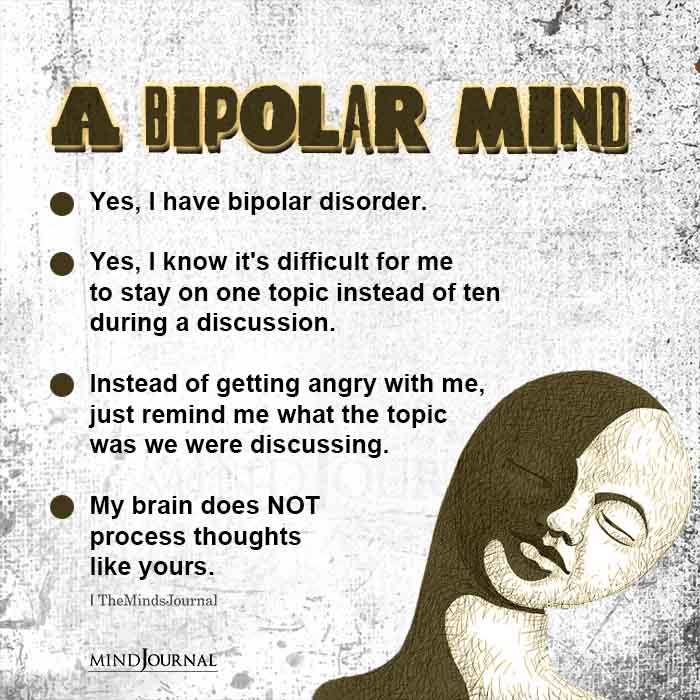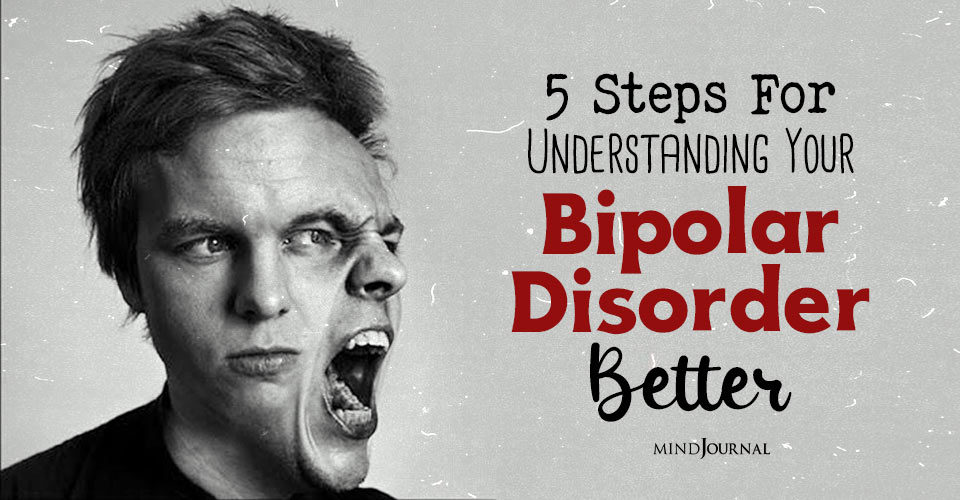“Mastering Bipolar Disorder: 5 Steps to Understanding Yourself Better”
Understanding your bipolar disorder is the key to managing it better. The more you understand how it works, the better you’ll get at handling its symptoms.
Key Points:
- Each person’s experience of bipolar disorder, such as the symptoms that stand out most, is unique.
- To better understand one’s bipolar disorder, one should be an active participant in learning about it and communicate with their treatment team.
- Mood tracking and noting personal triggers for symptoms may also be helpful.
Many people who are new to a diagnosis of bipolar disorder are interested in understanding what it means to have bipolar disorder and how to manage it.
The goal of this post is to break down the process of understanding your bipolar disorder into a series of tangible steps that, in combination, can move you forward on the path of increased understanding.
The most critical step to understanding your bipolar disorder is to understand your bipolar disorder. Your experience of bipolar disorder (such as the symptoms that stand out most to you) may be different from someone else’s experience of bipolar disorder.
Consider how each of these five steps below can be harnessed to better understand your own individual experience.
Related: Everything You Need To Know About Bipolar Disorder
5 Steps For Understanding Your Bipolar Disorder Better
1. Learn facts about bipolar disorder, especially as applied to you.
Familiarize yourself with the symptoms of depression and (hypo)mania, and with other symptoms that may go along with your bipolar disorder (such as anxiety and substance use).
Be an active participant in this learning by carefully attending to your own experience: Does your depression lead you to feel more fidgety and restless, or does it lead you to feel more slowed down?
Does your (hypo)mania make you feel more productive than usual, or does it lead you to start several tasks but not finish any of them?
By increasing your familiarity with and awareness of your own specific symptoms of bipolar disorder, you will be better able to recognize and seek help for these symptoms when they come up in the future.
It may also be helpful to learn about the potential causes of bipolar disorder. Overall, research suggests that various factors in combination may contribute to someone developing bipolar disorder.
Some of these factors may include genes (such as having a family history of bipolar disorder) and stressful life events (these could be events that produce negative or positive changes in your life, such as changes to an important relationship or starting a new job).
Consider your own life history and experiences, and how some of these factors could be relevant to you.
When learning about bipolar disorder, turn to credible, science-backed resources to receive accurate information.
Websites for organizations such as the National Institute of Mental Health (an organization devoted to researching mental illness) or the Depression and Bipolar Support Alliance (an organization providing support to people with depression and bipolar disorder) are some good, cost-free places to start your learning.

2. Communicate with your treatment team.
Effective treatment for bipolar disorder is a collaboration between you and your treatment team (such as your medication prescriber and psychotherapist). Be open with your treatment team about your symptoms and any questions that you may have about bipolar disorder.
Learn about any medications that you are taking and talk to your prescriber about side effects. Remember that while your treatment team is managing your care, you are the expert on you.
The relevant health information that you provide your treatment team will allow them to learn more about you, which can be helpful for collaborating on an effective treatment plan.
Related: Bipolar Disorder: 10 Facts You Should Know About It
3. Begin tracking your moods.
Tracking your moods is a great way to better understand your bipolar disorder. A basic mood tracker involves rating your daily mood, with separate ratings for (hypo)mania and depression.
Rate your daily symptoms of (hypo)mania and/or depression on a scale with descriptors of “not present,” “mild,” “moderate,” and “severe.” Some people find it helpful to also include similar ratings for other symptoms that stand out for them, such as anxiety.
You can make your own paper-and-pencil mood tracker or use one of the many mobile apps that are designed for mood tracking.
The goals of mood tracking are for you to get in the habit of attending to your mood on a regular basis, which can increase your awareness of different mood states; recognize any patterns in your daily moods; and increase awareness of triggers for your daily moods.
If you are comfortable, it can also be very helpful to check with a trusted friend or loved one on your daily moods. For some people, it can be challenging to know when they are experiencing symptoms of (hypo)mania or depression, especially if bipolar disorder is a new diagnosis for them.
In these cases, ongoing conversations with a trusted person about your daily moods can help you better recognize specific mood symptoms when they come up next time.

4. Be aware of your own personal triggers for mood symptoms.
Personal triggers are factors that increase your risk of experiencing changes in your mood.
Reflect on recent experiences of depression and hypomania and consider whether there were any factors that you noticed occurred before you developed those moods. These may be your personal triggers for mood changes.
Related: What Is Manic Depression? Types, Symptoms, and Treatment
5. Be aware of your personal warning signs for mood episodes.
Your personal warning signs provide a clue that an episode of depression or (hypo)mania is starting to develop. Make note of your own personal warning signs for mood episodes.
Initial changes in your mood can be helpful warning signs. Use your daily mood tracking to help you recognize these early changes.
Consider any behaviors that you notice go along with changes in your mood; these also may be your personal warning signs.
For instance, perhaps you notice that when you are starting to feel early symptoms of (hypo)mania, such as slightly increased energy, you notice increases in your spending patterns that are not typical for you (a potential warning sign for (hypo)mania).
Want to know more about how to understand bipolar disorder? Check this video out below!
References:
Johnson SL, Cueller AK, Ruggero C, Winett-Perlman C, Goodnick P, White R, Miller I. Life events as predictors of mania and depression in bipolar I disorder. J Abnorm Psychol. 2008 May;117(2):268-277. Miklowitz, D. J. (2019). The Bipolar Disorder Survival Guide, Third Edition: What You and Your Family Need to Know. Guilford Publications. Otto, M., Reilly-Harrington, N., Kogan, J. N., Henin, A., Knauz, R. O., & Sachs, G. S. (2008). Managing bipolar disorder: a cognitive behavior treatment program. Oxford University Press.
Written By Alexandra Gold Ph.D. Originally Appeared On Psychology Today









Leave a Reply
You must be logged in to post a comment.